The AMD Zen and Ryzen 7 Review: A Deep Dive on 1800X, 1700X and 1700
by Ian Cutress on March 2, 2017 9:00 AM ESTBenchmarking Performance: CPU Web Tests
One of the issues when running web-based tests is the nature of modern browsers to automatically install updates. This means any sustained period of benchmarking will invariably fall foul of the 'it's updated beyond the state of comparison' rule, especially when browsers will update if you give them half a second to think about it. Despite this, we were able to find a series of commands to create an un-updatable version of Chrome 56 for our 2017 test suite. While this means we might not be on the bleeding edge of the latest browser, it makes the scores between CPUs comparable.
SunSpider 1.0.2 [link]
The oldest web-based benchmark in this portion of our test is SunSpider. This is a very basic javascript algorithm tool, and ends up being more a measure of IPC and latency than anything else, with most high performance CPUs scoring around about the same. The basic test is looped 10 times and the average taken. We run the basic test 4 times.
Mozilla Kraken 1.1 [link]
Kraken is another Javascript based benchmark, using the same test harness as SunSpider, but focusing on more stringent real-world use cases and libraries, such as audio processing and image filters. Again, the basic test is looped ten times, and we run the basic test four times.
Google Octane 2.0 [link]
Along with Mozilla, as Google is a major browser developer, having peak JS performance is typically a critical asset when comparing against the other OS developers. In the same way that SunSpider is a very early JS benchmark, and Kraken is a bit newer, Octane aims to be more relevant to real workloads, especially in power constrained devices such as smartphones and tablets.
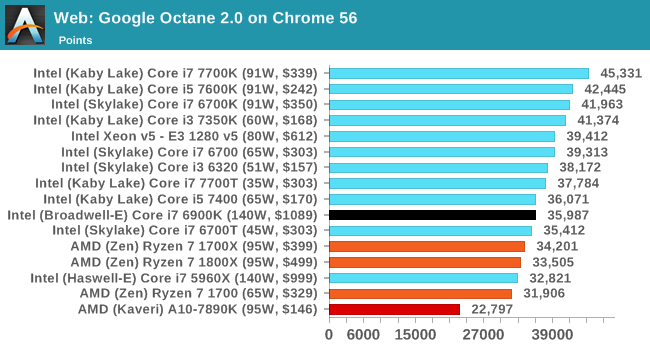
WebXPRT 2013 and 2015 [link]
While the previous three benchmarks do calculations in the background and represent a score, WebXPRT is designed to be a better interpretation of visual workloads that a professional user might have, such as browser based applications, graphing, image editing, sort/analysis, scientific analysis and financial tools. Web2013 is the older tool, superceded by Web2015, however both still are highly relevant for high-performance web applications today.
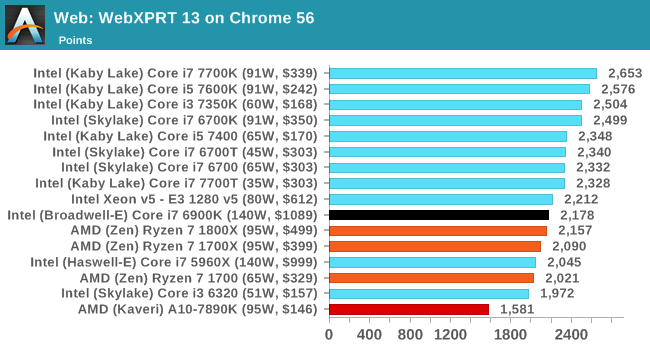
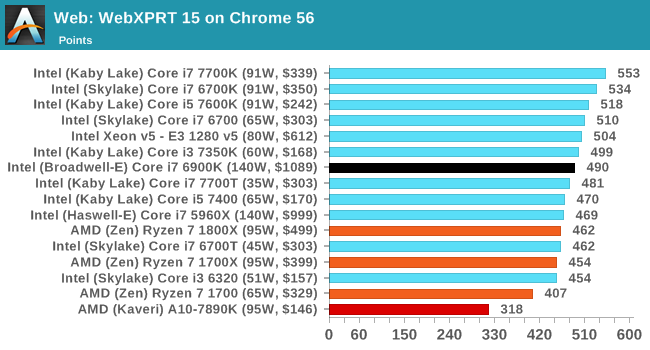


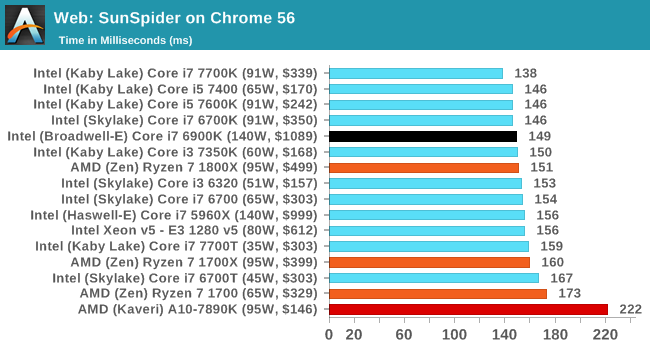
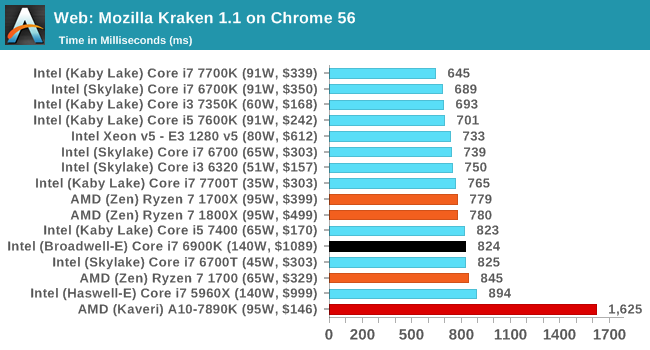








574 Comments
View All Comments
deltaFx2 - Wednesday, March 8, 2017 - link
@Meteor2: No. Consumer GPUs have poor throughput for Double precision FP. So you can't push those to the GPU (unless you own those super-expensive Nvidia compute cards). Apparently, many rendering/video editing programs use GPUs for preview but do the final rendering on CPU. Quality, apparently, and might be related to DP FP. I'm not the expert, so if you know otherwise, I'd be happy to be corrected and educated. Also, you could make the same argument about AVX-256.The quoted paragraph is probably the only balanced statement in that entire review. Compare the tone of that review with AT review above.
On an unrelated note, there's the larger question of running games at low res on top-end gpus and comparing frame-rates that far exceed human perception. I know, they have to do something, so why not just do this. The rationale is: " In future a faster GPU in future will create a bottleneck ". If this is true, it should be easy to demonstrate, right? Just dig through a history of Intel desktop CPUs paired with increasingly powerful GPUs and see how it trends. There's not one reviewer that has proven that this is true. It's being taken as gospel. OTOH, plenty of folks seem happy with their Sandy Bridge + Nvidia 1080, so clearly the bottleneck isn't here 5 years after SB. Maybe, just maybe, it's because the differences are imperceptible?
Ryzen clearly has some bottlenecks but the whole gaming thing is a tempest in a tea-cup.
theuglyman0war - Thursday, March 9, 2017 - link
ZBRUSHprobably 90% of all 3d assets that are created from concept ( NOT SCANNED )
Went through Zbrush at some point.
Which means no GPU acceleration at all.
Renderman
Maxwell
Vray
Arnold
still all use CPU rendering As do a mountain of other renderers.
Arnold will be getting an option
But the two popular GPU renderers are Otoy Octane and Redshift...
The have their excellent expensive place. But the majority of rendering out there is still suffered through software rendering. And will always be a valid concern as long as they come FREE built into major DCC applications.
theuglyman0war - Thursday, March 9, 2017 - link
Saw that same GPU trumps CPU render validity concerns...Comment and had a good laugh.
I'll remember to spread that around every time I see Renderman Vray Arnold Maxwell sans GPU rendering going on.
Or the next time a Mercury engine update negates all non Quadro GPU acceleration.
To be fair a lot of creative pros and tech artists seem to disagree with me but...
The only time between pulling vrts in Maya and brushing a surface in Zbrush that I really feel that I am suffering buckets of tears and desire a new CPU ( still on i7-980x ) is when I am cussing out a progress bar that is teasing me with it's slow progress. And that means CORES! encoding... un compressing... Rendering! Otherwise I could probably not notice day to day on a ten year old CPU. ( excluding CPU bound gaming of course... talking bout day to day vrt pulling )
I was just as productive in 2007 as I am today.
MaidoMaido - Saturday, March 4, 2017 - link
Been trying to find a review including practical benchmarks for common video editing / motion graphics applications like After Effects, Resolve, Fusion, Premiere, Element 3D.In a lot of these tasks, the multithreading is not always the best, as a result quad core 6700K often outperforms the more expensive Xeon and 5960X etc
deltaFx2 - Saturday, March 4, 2017 - link
I would recommend this response to the GamersNexus hit piece: https://www.reddit.com/r/Amd/comments/5xgonu/analy...The i5 level performance is a lie.
Notmyusualid - Saturday, March 4, 2017 - link
@ deltaFx2Sorry, not reading a 4k worded response. I'll wait for Anand to finish its Ryzen reviews before I draw any final conclusions.
Meteor2 - Tuesday, March 7, 2017 - link
@deltaFX2 RE: in the 4k word Reddit 'rebuttal', what that person seems to be saying, is that once you've converted your $500 Ryzen 1800X into a 8C/8T chip, _then_ it beats a $240 i5, while still falling short of the $330 i7. Out-of-the-box, it has worse gaming performance than either Intel chip.That's not exactly a ringing endorsement.
The analysis in the Anandtech forums, which concludes that in a certain narrow and low power band a heavily down-clocked 1800X happens to get excellent performance/W, isn't exactly thrilling either.
deltaFx2 - Wednesday, March 8, 2017 - link
@ Meteor2: The anandtech forum thing: Perf/watt matters for servers and laptop. Take a look at the IPC numbers too. His average is that Zen == Broadwell IPC, and ~10% behind Sky/Kaby lake (except for AVX256 workloads). That's not too shabby at all for a $300 part.You completely missed the point of the reddit rebuttal. The GN reviewer drops i5s from plenty of tests citing "methodological reasons", but then says R7==i5 in gaming. The argument is that plenty of games use >4 threads and that puts i5 at a disadvantage.
tankNZ - Sunday, March 5, 2017 - link
yes I agree, it's even better than okay for gaming[img]http://smsh.me/li3a.png[/img]deltaFx2 - Monday, March 6, 2017 - link
You may wish to see this though: https://forums.anandtech.com/threads/ryzen-strictl... Way, way, more detailed than any tech media review site can hope to get. No, it's got nothing to do with gaming. Gaming isn't the story here. AMD's current situation in x86 market share had little to do with gaming efficiency, but perf/watt.I'll quote the author: "850 points in Cinebench 15 at 30W is quite telling. Or not telling, but absolutely massive. Zeppelin can reach absolutely monstrous and unseen levels of efficiency, as long as it operates within its ideal frequency range."